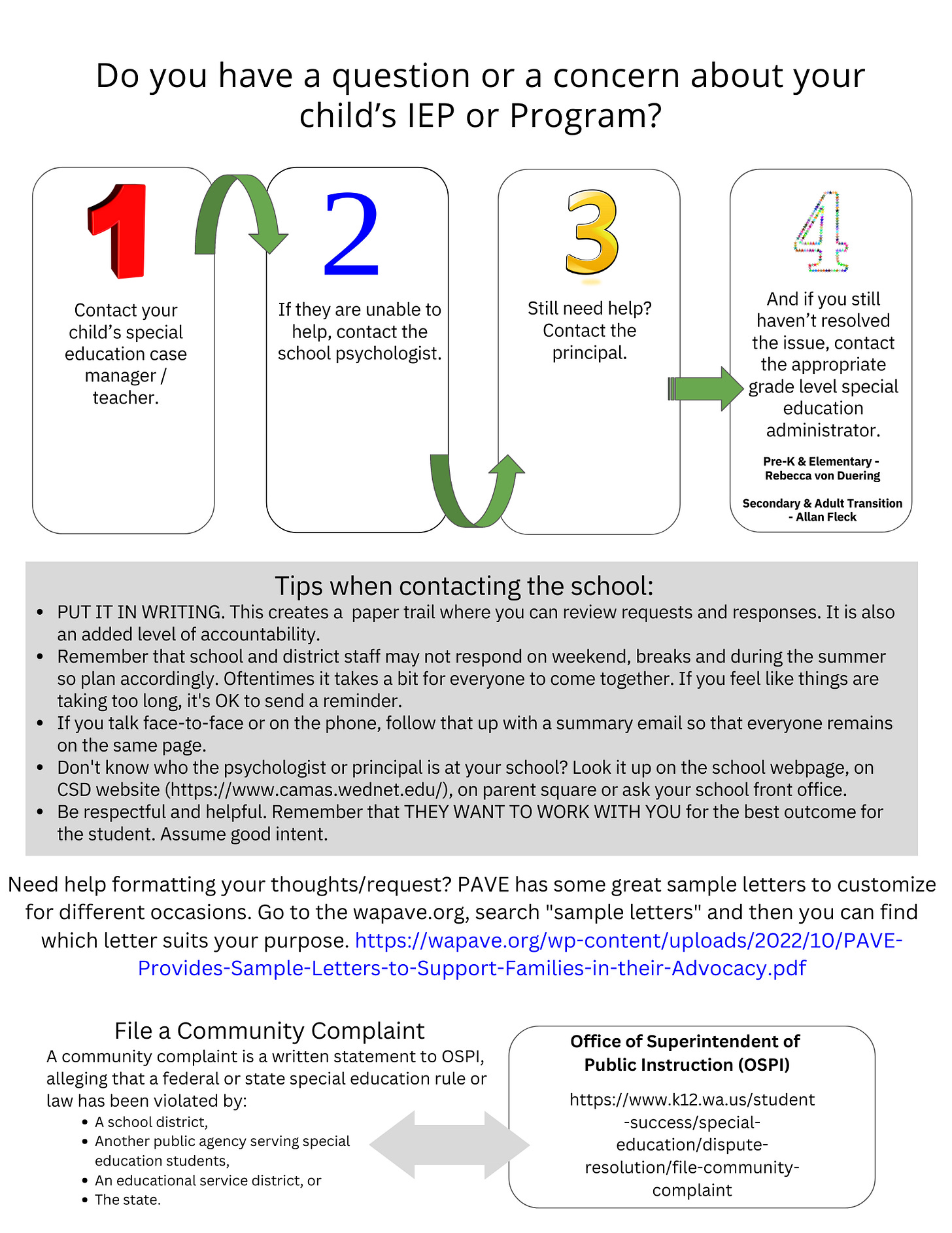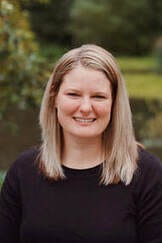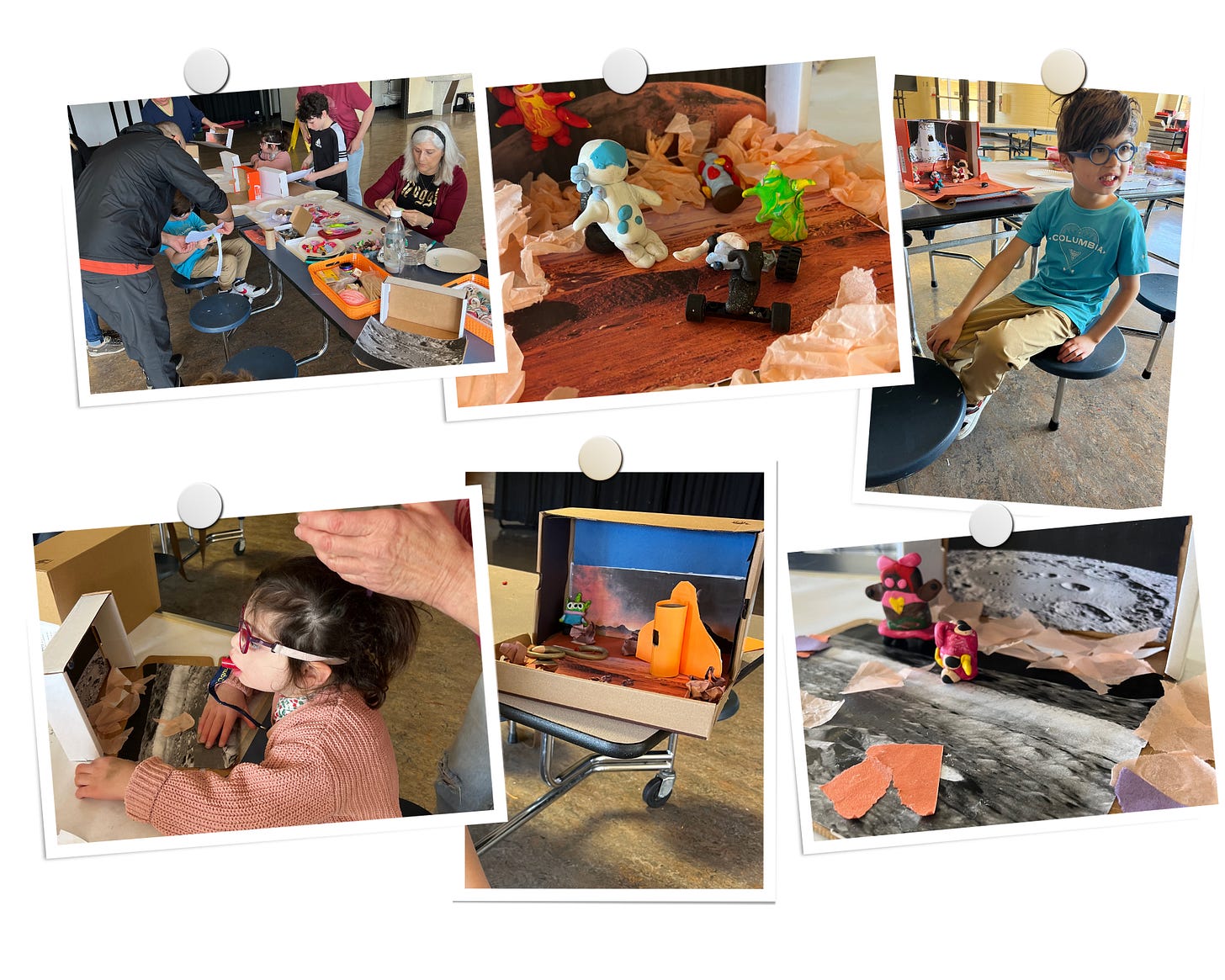March 2023
In This Issue
FAMILY NIGHT: Take a look
PARENT SUPPORT GROUP: Why I need this in my life
COMMUNITY INPUT: Get your voice heard!
QUICK TIPS: Where to go for conflict resolution
GUEST SPEAKER: Kendra Holloway Clinic Director Columbia Pediatric Therapy
GENERAL MEETING: Where to go to view
CAMAS COMMUNITY ED: First inclusion class
UPCOMING EVENTS: What’s next and how to get involved
TEACHER NOMINATIONS: See the great staff at CSD.
Family Night
We had an awesome turnout for our first ever family night. A big thank you to Columbia Pediatric Therapy who sponsored the food. We had yard games, sensory tables (rice is messy!), happy parents and tired kiddos.
Our next Family Night will be Friday April 14th. We need help planning Family Nights so if this interests you, let us know. Do you have any suggestions for our next Family Night? What worked for your family, what didn’t? We want to hear from you!
Parent Support Group
The parent support group is for parents to have a safe place to talk. It’s hard being a parent! The amount of energy, sacrifice and patience it takes can be overwhelming. We get frustrated, angry and discouraged sometimes and need a support system to navigate the ups and downs. Do you sometimes feel isolated, lonely or silenced? Would you like to make connections with other parents? This is the group for you.
Community Input
Community Opportunity
Papermaker Pride is asking for 3 differently abled students to be in their online advertising campaign. This is a great way for differently abled students to see themselves reflected in the world and the world to see them. If you are interested in participating, please email Gina.Hines@camas.wednet.edu
Community Events
Easter is coming up and here are some great sensory friendly / disability friendly activities:
Quick Tips
*Coming soon to our website here.
Meet Kendra Holloway, MS, CCC - SLP & Clinic Director
Columbia Pediatric Therapy
Occupational and Speech Therapy: Could They Help My Child?
As parents, family members and educators, we want the best for our children from infancy to adulthood. How we go about achieving that depends greatly on each individual child’s strengths and areas of challenge.
In speech and occupational therapy, our goal is to provide each individual with the services they need to live their best life, working collaboratively with their parents, family, and other team members. But what are all of the facets of speech and occupational therapy? And could they be a good fit to support your child or a child that you work with?
What skills and goals could a speech therapist help with?
It is often common knowledge that a speech therapist, or speech-language pathologist (“SLP”), can help a child learn to say their R’s, L’s, or TH’s However, there are many other very important aspects of speech therapy that are lesser known but potentially highly impactful for many individuals. Speech therapists can evaluate and treat in the areas of; speech/articulation, apraxia of speech, spoken language, written language, social communication, oromyofunctional disorders, feeding, swallowing, cognitive, augmentative-alternative communication (“AAC”), and resonance.
· Articulation (difficulty producing speech sounds correctly) comprises one of the speech therapy umbrellas known as “Speech”. A child with difficulty being understood by others could exhibit sound substitutions (e.g. "tat" for ‘cat’), omissions (e.g. “dah” for ‘dog’), or distortions (such as a lisp) that limit the listeners ability to understand what your child is trying to tell them. Childhood apraxia of speech, which often also impacts a child’s intelligibility (ability to be understood by others), is characterized by inconsistent sound errors and is another area that could be supported by an SLP. Related to how we produce sounds is resonance, which pertains to the nasality of one’s speech, such as being hyper- or hypo-nasal.
· Spoken and written language are two more umbrellas in the speech therapy scope of practice. Examples of spoken language challenges include difficulty; associating letters with sounds, formulating sentences, correctly using grammar, expanding vocabulary or meeting age-expectations of spoken vocabulary, and listening or comprehension challenges. If a child struggles to read, write, or spell, an SLP could help with their written language skills.
· Social communication includes all of the unwritten rules of how we interact with those around us; using and reading nonverbal cues, the prosody/intonation of our speaking, adapting our language to suite our audience, taking turns when speaking, and so on.
· Oromyofunctional disorders pertain to the structure and function of the mouth and surrounding musculature and can impact speech, feeding, breathing, and even sleep.
· Feeding/swallowing is another core area of speech pathology that can help address coughing/choking when eating (from infancy through adulthood), limited weight gain, picky eating as a result of difficulty appropriately breaking down food, etc.
· Cognitive goals within speech therapy can address skills such as learning, memory, perception, and problem-solving.
· Augmentative & alternative communication (“AAC”) includes both ‘low-tech’ and ‘high-tech’ methods for communicating, such as picture exchange, picture boards, and speech-generating devices. It is a phenomenal support for individuals whose vocal speech limits their ability to communicate their thoughts, wants, and needs.
If you are wondering if speech therapy could be beneficial for a loved one, consider asking the staff at your local speech therapy clinic or scheduling an evaluation; it can be a great starting point for finding more information.
What do OT’s do to support children and young adults?
Occupational therapy is a term that, in and of itself, is difficult to interpret in terms of how it pertains to the pediatric population. What’s their occupation? Occupational therapists (“OT’s”) that work with toddlers, children, and young adults help these individuals with their everyday activities. This includes a variety of areas that we may never think of when we hear the term “OT”, such as; emotional regulation, sensory integration and sensory processing, cognitive skills such as executive functioning, adaptive skills, fine motor, and feeding.
· Emotional regulation plays a part in all of our daily lives, but especially our children’s as they learn to process and handle their own emotions. It can impact their day-to-day from how they feel to how they interact with others, including how to handle and work through their emotions.
· Sensory processing is how we perceive and process the world around us using the well-known “5 senses” in addition to other, lesser known, sensory systems of proprioception (body awareness), interoception (feeling what’s going on inside your body, such as hunger), and vestibular (movement and balance). These systems can have a big impact on our day-to-day living in ways that can be obvious or extremely subtle.
· Cognitive goals within occupational therapy can support how a child plans and executes actions in their day and can have an impact on their safety and long-term wellbeing.
· Adaptive skills involve activities of daily living. Getting themselves dressed, toilet training, brushing teeth, and even playing with others all fall in this category of occupational therapy.
· Fine motor skills pertain to the functioning of the smaller muscles in our bodies and how they impact our day to day life, such as with manipulating small buttons and zippers, using scissors, tying your shoes, or writing your name on a piece of paper.
· Feeding therapy, when addressed by an occupational therapist, can help picky eaters expand their repertoires and create more positive interactions with foods. It can also take into account the individual’s sensory needs and preferences and how those may be impacting their eating.
Occupational therapy in the private practice realm could support any of the above areas.
Considerations for therapy;
· For both speech and occupational therapy, an educational impact is necessary in order for the therapy to be conducted at school.
· School SLP’s can: evaluate for communication disorders, provide RTI services, consult in person with teachers, create resources and specialized strategies for students to succeed in the classroom, and support generalization of skills into the classroom.
· Parents can initiate the process in both settings;
o In schools – the school can evaluate the child to determine eligibility for services based on IDEA
o In private practice – typically you can coordinate with your pediatrician/family doctor for a referral for speech therapy.
· Therapists in both settings are committed to helping children and often are open to collaboration to make a greater impact.
Columbia Pediatric Therapy is a private practice clinic located off of highway 14 and 164th. Should you or anyone in our community have questions about speech therapy, occupational therapy, or other supports you are looking for for your child, please reach out to us. Our team is full of dedicated individuals whose main purpose is to help children live their best lives; however we are able to do so!
16703 SE McGillivray Blvd
Suite 170
Vancouver, WA 98683
Phone: (360) 989-7347
Vancouver, WA 98683
General Meeting on March 22nd
You can watch the video recording on our Facebook page here.
First Camas Community Ed (CCE) Inclusion Class
We’d like your thoughts on what types of classes your students want to attend, the price, the length and the caregiving requirement. Our first inclusive class was really fun. We had a mix of student abilities.
A little about the instructor who teaches art classes with CCE. Ms. Robinson has been very interested and enthusiastic to work more inclusive friendly classes into CCE’s program. We thank you Ms. Robinson for offering to work with us on creating something new!
Ms. Robinson has written professionally for over two decades as an art teacher and writer. She particularly enjoys teaching Sculpey clay classes to elementary students and has perfected her craft over 15 years of instruction. Her move to Vancouver in 2018 has proved successful on many levels – she now has both of her children nearby and is subbing actively in the Evergreen and Camas School Districts. Her classes have been well-received during the summer camps and for special Halloween and Christmas projects.
Ms. Robinson has a special place in her heart for the community of differently-abled children (being Mom to an adult young man on the Spectrum) and she is very pleased to teach her classes to children of all abilities. She looks forward to teaching children in Camas!
Upcoming Events
General Meeting: Tuesday, May 30th at 6:00 pm at the Camas Public Library, upstairs meeting room. Virtual option available.
Parent Hour: Saturday, March 25th at 10:00 am at Café Piccolos.
Intended for parents to connect while having some kid free time.
A sign will be on our table so you can find us
Drop in anytime.
Next Parent Hour events will April 28, and May 27
Parent Support Group: Tuesday, April 18th 6:30 pm at Zellerbach Admin Center (this location may change so please check Facebook or the website for an update)
A safe and confidential place for parents to talk about what is going on in their lives.
Guided by Tori Watrous, local mental health counselor
Adults only, no children, please.
Next Parent Support Group meeting will be May 16, may continue during summer.
Family Night: Friday, April 14 at 6:00 pm at The Heights Learning Center (this location may change so please check Facebook or the website for an update)
Meet families in your community. Connect in a relaxed atmosphere. Feel free to stay for as long as your family is comfortable (6:00pm-8:00pm). Please RSVP by April 10th so we have a head count for the food.
Next Family Nights will be May 12, and June 9 (end-of-year party)
Teacher Nominations
Amy Campbell, teacher at Helen Baller Elementary - Seriously! She brings inclusivity, kindness, acceptance and community, even outside of the classroom.
Nick Calais, occupational therapist - He works so well with the kids making things fun and interesting. My daughter LOVED him in preschool. Her face lit up every time she saw him. You may have seen him in Camas as his family is very active in the community.
Dr. Sork, principal at Dorothy Fox Elementary - You can tell how much she loves the kids and how much she works to make Dorothy Fox a welcoming environment to ALL students.
Kristin Neumann, resource room teacher at Grass Valley Elementary - We loved her when my kids were at Grass Valley. She is so dedicated, patient and kind. She’s also a great communicator, so I always had a picture of what was going on in the school environment, and always included us in decisions. We sure miss her this year now that my kiddos have moved on to middle school.
Please consider becoming a member. You can purchase memberships here.












